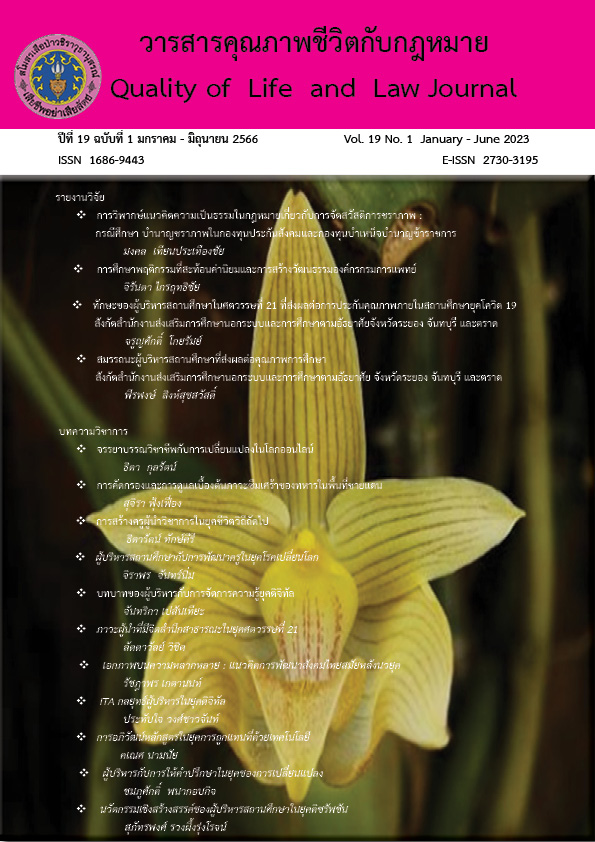Unity over Diversity: Concepts for the Development of Thai Society in the Postmodern Era
Main Article Content
Abstract
Thailand, as a country in the ASEAN Community, and, Thailand is another country that is characterized by high diversity, that is, there is a multicultural society consisting of people of various races, religions, languages and cultures. With these diversities, Thai people live peacefully a long time ago. But in the latter period, this era was found that many violent conflicts occurred in Thailand, which have the main cause of the conflicts of ideas that are caused by a variety of multicultural differences which is difficult to create a unified unity of thought.
The Thai government under the leadership of Prime Minister General Prayut Chan-o-cha has seen the importance of reducing conflict and create a way to solve problems to unite the people in the nation to be united. Under the concept of creating unity on diversity, strengthen unity, reconciliation in hopes to reduce conflicts of opinion among people in the nation to conform to the postmodern paradigm. This paradigm shift greatly affects the thinking and lifestyle of humans today. So we must learn to change and accept new paradigms as well as finding new ways to resolve this conflict. The idea of creating unity by emphasizing unity in its original meaning may have to change to building unity over diversity. Create unity, reconciliation, reconciliation by using the democratic process in the postmodern era as a driver to reduce self-confidence, accept the difference, understand the change, respect various opinions and able to see other things with understanding and peace. These will be a way to solve conflicts in Thai society sustainably.
Article Details

This work is licensed under a Creative Commons Attribution-NonCommercial-NoDerivatives 4.0 International License.
- บทความหรือข้อคิดเห็นใดๆ ในวารสารคุณภาพชีวิตกับกฎหมายเป็
- กองบรรณาธิการไม่สงวนสิทธิ์
References
เกณฑ์การบริหารการจัดการภาครัฐ. (2565). ความหลากหลาย. http://doh.hpc.go.th/pmqa2562/topicDisplay.php?id=22
เกรียงศักดิ์ เจริญวงศ์ศักดิ์. (2565). เอกภาพบนความหลากหลาย ค่านิยมที่ต้องสร้างให้เด็กไทย.
http://www.kriengsak.com/node/660
ขวัญนภา อุณหกานต์. (2562). เอกภาพและความหลากหลายกับนโยบายเพื่อการพัฒนาการศึกษา.
file:///C:/Users/Admin/Downloads/chonnanee
ชะลูด นิ่มเสมอ. (2565). เอกภาพ.
http://www.digitalschool.club/digitalschool/art/art3_1/lesson1/Page16.php
ชาญเชาวน์ ไชยานุกิจ. (2565). เอกภาพในความแตกต่าง. คมชัดลึกออนไลน์, หน้า 1,
https://www.komchadluek.net/news/126931
ชลิดาภรณ์ ส่งสัมพันธ์. (2562). ความหลากหลายทางวัฒนธรรม สังคมพหุนิยม กับประชาธิปไตย.
http://thaiciviceducation.org/th
นาวิน พิชญวิศิษฏ์กุล. (2560). ปรัชญาหลังนวยุค : อะไร อย่างไร และทำไม. วารสารปรัชญาปริทรรศน์, 22(1), 147-155.
ประทุม อังกูรโรหิต. (2556). ปรัชญาปฏิบัตินิยม: รากฐานปรัชญาการศึกษาในสังคมประชาธิปไตย.
กรุงเทพ: สำนักพิมพ์จุฬาลงกรณ์มหาวิทยาลัย.
ประเสริฐ ศีลรัตนา. (2565). เอกภาพ.
http://www.digitalschool.club/digitalschool/art/art3_1/lesson1/Page16.php
สอ เสถบุตร. (2565). เอกภาพ.
http://www.digitalschool.club/digitalschool/art/art3_1/lesson1/Page16.php
สำนักนายกรัฐมนตรี. (2560). การสร้างความปรองดองสมานฉันท์ รายงานผลการดำเนินงานของรัฐบาล พลเอก ประยุทธ์ จันทร์โอชา นายกรัฐมนตรี.
วิกิพิเดีย. (2565). ความหลากหลาย. https://th.wikipedia.org/wiki
Dewey, John. (2015). Demrocracy and Education. New York: The Free Press.
TAFT. (2565). เอกภาพท่ามกลางความหลากหลาย. https://www.gotoknow.org/posts/76278


